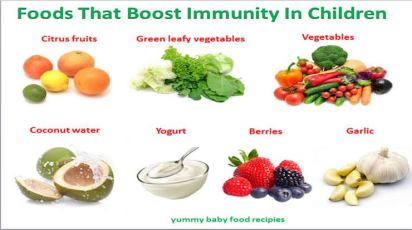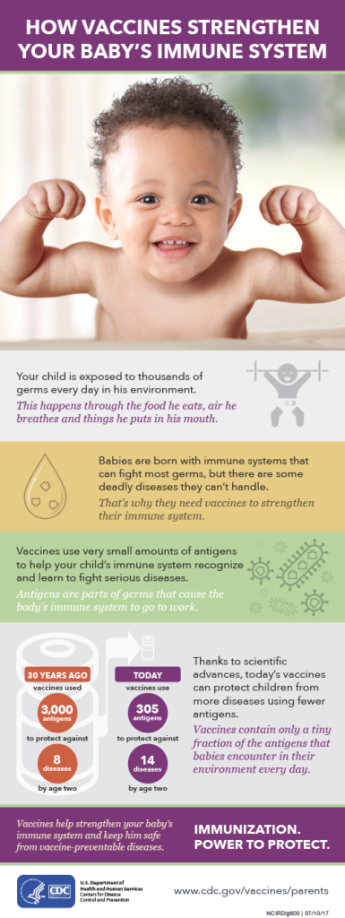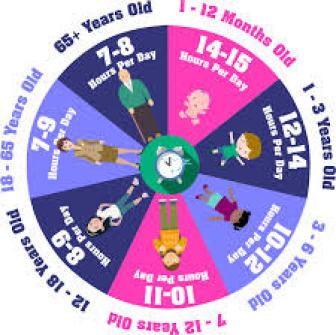10 Ways To Boost Your Child’s Immunity
Due to the ongoing COVID19 global pandemic, humankind is in troublesome situation. We all are completely locked down in our house and we can’t even think about roaming outside because of fear of COVID19. While adults have developed immune system so their probability of getting COVID19 virus is low, but children below 5 have weaker health system and so their are higher chances of getting COVID19 virus.So, here we are with an amazing article which could help you boost your child’s immune system.
What is the immune system?
A condition of being able to resist a particular disease especially through preventing development of a pathogenic microorganism or by counteracting the effects of its products.
The important task of immune system.
Without an immune system, we would have no way to fight harmful things that enter our body from the outside or harmful changes that occur inside our body. The main tasks of the body’s immune system are
- to fight disease-causing germs (pathogens) like bacteria, viruses, parasites or fungi, and to remove them from the body,
- to recognize and neutralize harmful substances from the environment, and
- to fight disease-causing changes in the body, such as cancer cells.
Child Mortality
Child mortality is the death of a child before the child’s fifth birthday, measured as the under-5 child mortality rate (U5MR). National statistics sometimes group these two mortality rates together. Globally, 5.3 million children died before their fifth birthday in 2018. In 1990 the number of child deaths were 12.6 million. More than 60% of these deaths are seen as being avoidable with low-cost measures such as continuous breast-feeding, vaccinations and improved nutrition.
In 1990, 9 million infants younger than 1 year died globally. Until 2015 this number has almost halved to 4.6 million infant deaths.Over the same period, the infant mortality rate declined from 65 deaths per 1,000 live births to 29 deaths per 1,000 live births.
More than half of under-5 child deaths are due to diseases that are preventable and treatable through simple, affordable interventions. Strengthening health systems to provide such interventions to all children will save many young lives.
Furthermore, malnourished children, particularly those with severe acute malnutrition, have a higher risk of death from common childhood illness such as Diarrhoea, Pneumonia, and Malaria. Nutrition-related factors contribute to about 45% of deaths in children under-5 years of age.
Below are the leading causes of child deaths with some risk factors and cure.
| Cause of death | Risk factors | Prevention | Treatment |
| Pneumonia, or other acute respiratory infections | Low birth weight Malnutrition Non-breastfed children Overcrowded conditions | Antenatal care visits for mother Adequate nutrition Exclusive breastfeeding Reduction of household air pollutionVaccination | Appropriate care by a trained health provider Antibiotics Oxygen for severe illness |
| Childhood diarrhoea | Non-breastfed children Unsafe drinking water and food Poor hygiene practices Malnutrition | Exclusive breastfeeding Safe water and food Adequate sanitation and hygiene Adequate nutrition Vaccination | Low-osmolarity oral rehydration salts (ORS) Zinc supplements |
What can you do to protect your child from the endless array of germs and viruses they’re exposed to every day?
There are several ways by which you can protect your child, though all of them aims to strengthen their immune system. Given below is the list of ways that will boost their health system.
1. Serve more fruits and vegetables

Carrots, green beans, oranges, strawberries: They all contain carotenoids, which are immunity-boosting phytonutrients, says William Sears, M.D., author of “The Family Nutrition Book”. Phytonutrients may increase the body’s production of infection-fighting white blood cells and interferon, an antibody that coats cell surfaces, blocking out viruses. Studies show that a diet rich in phytonutrients can also protect against such chronic diseases as cancer and heart disease in adulthood. Try to get your child to eat five servings of fruits and veggies a day
Don’t use pesticide food for eating because it has long term harmful effects in our body, few are mentioned below.

2. Vaccines

Vaccination usually begins when a child is six weeks old. Since several of the diseases vaccinated against affect the youngest children the hardest, delays should be avoided. Booster doses are given when a child reaches school age.

Vaccines contain the same antigens (or parts of antigens) that cause diseases. For example, measles vaccine contains measles virus. But the antigens in vaccines are either killed, or weakened to the point that they don’t cause disease. However, they are strong enough to make the immune system produce antibodies that lead to immunity. In other words, a vaccine is a safer substitute for a child’s first exposure to a disease. The child gets protection without having to get sick. Through vaccination, children can develop immunity without suffering from the actual diseases that vaccines prevent.
The recommended vaccination programs for children and adolescents includes vaccines against twelve different diseases: Rota-virus, Diphtheria, tetanus, whooping cough, poliomyelitis, infection with Haemophilus Influenzae Type B (Hib), Hepatitis B, Pneumococcal disease, Measles, Mumps, Rubella and Human Papilloma virus (HPV), which can cause Cervical cancer and other cancers cause by HPV. Some children are also offered vaccination against Tuberculosis. All these diseases can be life-threatening or result in serious complications.
3. Breast-feed your baby

Breast milk contains turbo-charged immunity-enhancing antibodies and white blood cells. Nursing guards against ear infections, allergies, diarrhea, pneumonia, meningitis, urinary tract infections, and sudden infant death syndrome (SIDS). Studies show that it may also enhance your baby’s brain power and help protect her against insulin-dependent diabetes, Crohn’s disease, colitis, and certain forms of cancer later in life. Colostrum, the thin yellow “premilk” that flows from the breasts during the first few days after birth, is especially rich in disease-fighting antibodies, says Dr. Shubin. The American Academy of Pediatrics recommends that moms exclusively breastfeed for the first six months of life. If this commitment isn’t realistic, aim to breastfeed for at least the first two to three months in order to supplement the immunity your baby received in utero.
Before reading further please fill the feed back form whose button is given below to help us to improve.
4. Boost sleep time

Studies of adults show that sleep deprivation can make you more susceptible to illness by reducing natural killer cells, immune-system weapons that attack microbes and cancer cells. The same holds true for children, says Kathi Kemper, M.D., director of the Center for Holistic Pediatric Education and Research at Children’s Hospital, in Boston. Children in daycare are particularly at risk for sleep deprivation because all the activity can make it difficult for them to nap. How much sleep do kids need? An infant may need up to 16 hours of crib time a day, toddlers require 11 to 14 hours, and preschoolers need 10 to 13 hours. “If your child can’t or won’t take naps during the day, try to put her to bed earlier” says Dr. Kemper.
5. Exercise

Research shows that exercise increases the number of natural killer cells in adults—and regular activity can benefit kids in the same way, says Ranjit Chandra, M.D., a pediatric immunologist at the Memorial University of Newfoundland. To get your children into a lifelong fitness habit, be a good role model. “Exercise with them rather than just urge them to go outside and play,” says Renee Stucky, Ph.D., a clinical psychologist in Columbia, Missouri. Fun family activities include bike riding, hiking, inline skating, basketball, and tennis.
6. War against germs

Fighting germs doesn’t technically boost immunity, but it’s a great way to reduce stress on your child’s immune system. Make sure your kids wash their hands often—and with soap. You should pay particular attention to their hygiene before and after each meal and after playing outside, handling pets, blowing their nose, using the bathroom, and arriving home from daycare. When you’re out, carry disposable wipes with you for quick cleanups. To help kids get into the handwashing habit at home, let them pick out their own brightly colored hand towels and soap in fun shapes, colors, and scents.
Another key germ-busting strategy: “If your child does get sick, throw out her toothbrush right away” says Barbara Rich, D.D.S., a spokesperson for the Academy of General Dentistry. A child can’t catch the same cold or flu virus twice, but the virus can hop from toothbrush to toothbrush, infecting other family members. If it’s a bacterial infection, such as strep throat, however, your child can reinfect herself with the same germs that got her sick in the first place. In that case, tossing the toothbrush protects both your child and the rest of your family.
7. Dryfuits and nuts

Children can be fussy about fruits and vegetables, but they may like to chomp on crunchy dry fruits and nuts like cashews, almonds and walnuts. You can make an interesting trail mix for them. Nutritionist Meher Rajput also backs the idea of loading up on nuts, “Have them in any form, dry or roasted. Walnuts, almonds, dates and raisins are good sources of vitamins and antioxidants. They are high in protein and sources of good fats which would also ensure that the energy levels of your child are always high.”
8. Herbs, Spices, and Sweeteners

Consume this healthy tonic for an immune system boost. It’s crafted from ingredients proven to support immune system function:
- Astragalus root
- Angelica root
- Honey
- Ginger
Honey activates the immune system’s response to infectionTrusted Source and prevents cell proliferation. Controlling cell proliferation is key to stopping pesky viruses.
Ginger has anti-inflammatory effectsTrusted Source as well and may be able to help with muscle pain.
A quick recipe for an immune boosting bitters:
Ingredients:
- 1 tbsp. honey
- 1 oz. dried astragalus root
- 1 oz. dried angelica root
- 1/2 oz. dried chamomile
- 1 tsp. dried ginger
- 1 tsp. dried orange peel
- 1 cinnamon stick
- 1 tsp. cardamom seeds
- 10 oz. alcohol (recommended: 100 proof vodka)
Directions:
- Dissolve the honey in 2 teaspoons of boiling water. Let cool.
- Combine the honey and the next 7 ingredients in a Mason jar and pour alcohol on top.
- Seal tightly and store the bitters in a cool, dark place.
- Let the bitters infuse until the desired strength is reached. It’ll take about 2–4 weeks. Shake the jars regularly (about once per day).
- When ready, strain the bitters through a muslin cheesecloth or coffee filter. Store the strained bitters in an airtight container at room temperature.
How to use it: Mix this bitters into hot tea or take a few drops first thing when you wake up for protection during cold and flu season.
9. Yoga

Yoga, perhaps, is one of the most effective and time-tested natural immunity boosters that we can adopt for a healthier life. It is an ancient art that strengthens the body and also relaxes the mind.
Yoga is a holistic practice which strengthens our body physically as well as mentally. As a result, the body’s defense mechanism also improves in such a condition. A healthy life can be easily achieved if we learn to adopt a healthy lifestyle, healthy food choices and regular practice of yoga and meditation. Ayurveda, yoga and meditation are the ideal factors to live a healthy life.
10. Prayer and meditation

Different types of meditation have been shown to result in psychological and biological changes that are actually or potentially associated with improved health. Meditation has been found to produce a clinically significant reduction in resting as well as ambulatory blood pressure, to reduce heart rate, to result in cardiorespiratory synchronization, to alter levels of melatonin and serotonin, to suppress corticostriatal glutamatergic neurotransmission, to boost the immune response, to decrease the levels of reactive oxygen species as measured by ultraweak photon emission, to reduce stress and promote positive mood states, to reduce anxiety and pain and enhance self-esteem and to have a favorable influence on overall and spiritual quality of life in late-stage disease. Interestingly, spiritual meditation has been found to be superior to secular meditation and relaxation in terms of decrease in anxiety and improvement in positive mood, spiritual health, spiritual experiences and tolerance to pain.
Thanks for reading this article,
Team BloggerBoy.
Please fill the feed back form whose button is given below to help us to improve.


Excellent
Keep it up
Will wait to read ur next blog
Thanks sir.